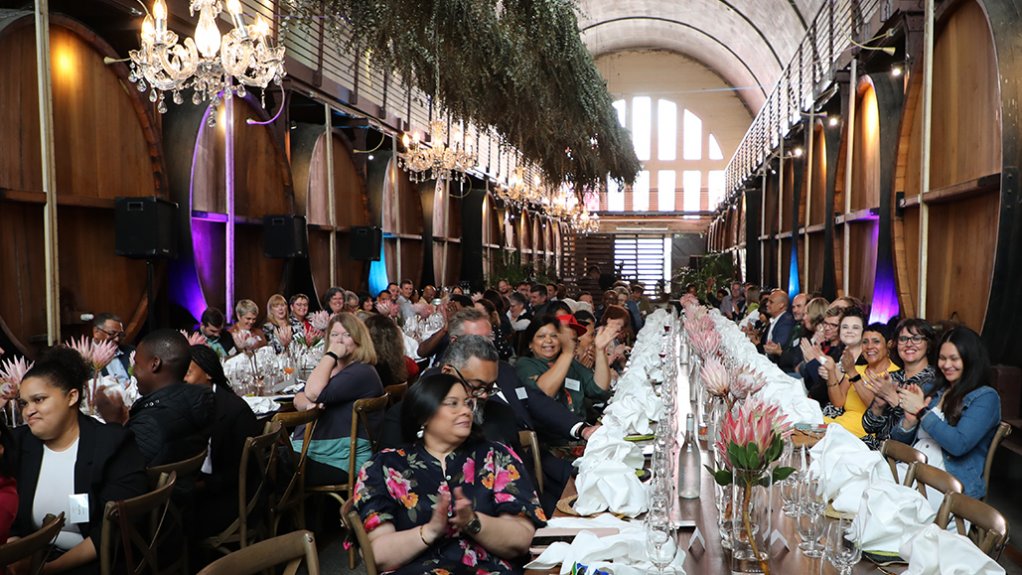Having officially launched the South African Wine Industry Professional Body (SAWIPB) last month, nonprofit advocacy organisation South Africa Wine maintains its pledge to address challenges facing the wine industry through transformation and people development; information transfer; research, development and innovation (RDI) and contribution to the socioeconomic development of South Africa.
The launch of the SAWIPB will credit the various members of the South African wine industry that continue to improve agricultural, business and ethical procedures in the wine industry, notes South Africa Wine communications and brand manager Wanda Augustyn.
“The launch helped formalise the establishment of the professional body by celebrating our members and handing out the first awards.”
The SAWIPB is also supported by the Food & Beverages Manufacturing Sector Education and Training Authority (FoodBev Seta), which sees the launch of SAWIPB as a commendable leap forward for the wine sector in South Africa.
“I am thrilled to offer full support for the launch of South Africa Wine’s and its RDI department’s new professional body within the wine industry. This initiative marks a significant step forward in our pursuit of excellence in the wine sector. By focusing on skills development, the professional body will not only elevate the expertise of wine professionals but also provide them with the tools and knowledge needed to excel in their careers. “This advancement will not only contribute to the overall growth and sustainability of the wine industry but also ensure that we maintain a highly skilled workforce. It's a win-win for wine enthusiasts, experts and the industry. I applaud this effort and believe it will make a substantial impact on skills development within the wine sector,” says FoodBev Seta CEO Nokuthula Selamolela.
South Africa Wine also promotes responsible drinking to combat alcohol abuse and misuse. South Africa Wine is a member of the alcoholic drinks industry body Association for Alcohol Responsibility and Education which aims to create a socially responsible drinking culture in South Africa and reduce the harmful consumption of alcohol through public education and awareness, evidence-based targeted interventions and effective partnering and relationship management. As such, South Africa Wine and its members are committed to specific educational programmes and campaigns aimed at promoting the responsible consumption of alcohol. These include addressing foetal alcohol spectrum disorder, drinking and driving or walking, underage drinking, community formalisation and binge drinking.
Through its Industry Affairs department, South Africa Wine advocates on behalf of the wine industry on various issues.
“The Liquor Amendment Bill, introduced in 2016, is still in the background and has yet to be passed. As an industry, we are equally concerned about liquor abuse/misuse, but given the highly regulated alcohol environment, the industry is geared towards responsible trading and drinking, and any further suggested regulations, without firm enforcement measures and benchmarked against empirical best practices research and data, will not have the desired effect,” Augustyn adds.
South Africa Wine also aims to address some of the main challenges faced by the industry by adopting in-depth RDI initiatives that focus on several key aspects, which will enhance the operations of grape-growing and winemaking, and ensure that the wine industry maintains its global competitiveness, profitability and sustainability.
The RDI department will focus on credible market, consumer and competitor information to enhance a strategic framework for data-driven decision-making; new technologies and research outcomes that will improve the organisation’s contribution to sustainability and environmental preservation while maintaining productivity and profitability; and risk mitigation initiatives developed by in-depth climate and terrain information, Augustyn explains.
Additionally, the RDI department will also work towards implementing “game changers” such as establishing an innovation ecosystem, improving data intelligence, enhancing communication by updating the local wine industry directory, enhancing winemaking processes and products, as well as improving overall vineyard readiness for climate change and weather implications.
Flooding and bad weather may plague vineyard crops and hinder trading and operational hours at ports. South Africa Wine, its RDI and Industry Affairs departments and other industry members are constantly working towards mitigating these challenges through research, development and advocacy.
“South Africa Wine works closely with various industry bodies, government and organised agriculture. We support various public-private initiatives where we focus on energy, logistics, and crime and corruption,” concludes Augustyn.
Edited by: Nadine James
Features Deputy Editor
EMAIL THIS ARTICLE SAVE THIS ARTICLE
ARTICLE ENQUIRY
To subscribe email subscriptions@creamermedia.co.za or click here
To advertise email advertising@creamermedia.co.za or click here













